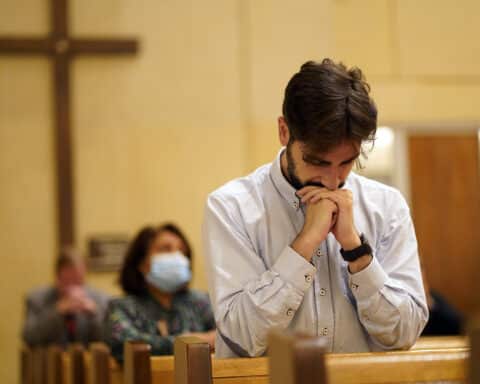You’ve probably heard “hate the sin, love the sinner.” But what about “hate the political position, love the person who holds it?”
That can be tougher, can’t it? Especially as the country heads toward a major election and the incumbents and opposing candidates increase the rhetoric, heat and … vitriol.
Ooh, that’s a good word! It even sounds bad. It means “cruel and bitter sarcasm.” And, historically, was a name for sulfuric acid.
Yes, when red and blue clash, almost everyone ends up at least a little “bruisey” purple.
Pre-internet author Thomas Mann wrote, “Everything is politics.” And pre-social-media-everywhere Speaker of the House of Representatives Tip O’Neill was most closely associated with the saying, “All politics is local.”
What those gents meant is there’s no escape. That’s especially so now, in an era when many once commonly held beliefs and values have been fractured if not pulverized. These days, politicians and those who espouse or defend particular positions don’t so much throw their hats into the ring as don boxing gloves and have at it. Or just go at it bare-knuckled, tweet for tweet.
It seems the thumb is mightier than the sword.
Take a cue from Jesus
All right, that sets the stage. You know this. You have, to some degree, experienced the rough-and-tumble 21st-century “civic debate.”
So abandon hope all ye who live in this time period of time? Of course not. As a Catholic, take a cue from Jesus, which will make your life more in control and more … challenging.
Here’s what he said: “Love your enemies, and pray for those who persecute you that you may be children of your heavenly Father, for he makes his sun rise on the bad and the good, and causes rain to fall on the just and the unjust” (Mt 5:44-45).
If we want to be a brother or sister of Jesus, a child of our heavenly Father, we have to — hang on — literally pray for that self-centered, slimy, sleazy … and on and on.
“Like this for instance?” you may ask. “Dearest Lord, please help (fill in the blank) stop being such a self-centered, slimy, sleazy … .” How could the God of all goodness not grant such a truly heartfelt prayer?
And if that political bag of wind and malevolence remains unchanged, doesn’t that mean he or she is refusing God’s graces (which, by the way, you helped set in motion)? It can’t be you. It can’t be God. So, whom does that leave? Yep. He or she still has free will and so (shrug) what’re ya gonna do?
How about praying instead that, using that free will, each becomes more receptive to God’s will for him or her, not yours?
A few points to consider
1. God loves that no-good nudnik just as much as he loves you. Infinitely. And, again, to quote Jesus (which, at times, seems a little risky), love your neighbor (enemy) as you love yourself.
Just guessing here, but, by and large, you’re probably pretty fond of yourself. Sure, you’re not perfect but, hey, when lined up against all humility, you’re pretty good, right? Although, yes, it’s true you do rely rather heavily on God’s mercy.
And, of course: “Your heavenly Father … makes his sun rise on the bad and the good, and causes rain to fall on the just and the unjust” (Mt 5:45). Sometimes, you’re not so good, but most of the time you’re not so bad. And sometimes, maybe, you’re just a little unjust. But God still loves you.
2. Scripture scholars in “The New Jerome Biblical Commentary” have a thing or two to say about “love your enemies, and pray for those who persecute you” — and their explanation has, well, quite a political spin to it. They write:
“This is not hopeless idealism but a wise strategy for overcoming the persecutor. The heroic stance of the martyr gives the persecutor a bad image and is hard for governments to control. Early Christian martyrs gave late antiquity a bad conscience. Christianity is not introverted aggression, but aggression transmuted into a strategy for winning through the wisdom of love.”
Wow. “Winning through the wisdom of love.”
3. But what about on the micro-level? If “everything is politics,” it’s there, too. Where politics is really local.
Let’s put legislators, candidates, judges, laws and issues on hold for a moment and consider: What about our opinion of, and relationship with, for instance … .
This or that member of the parish council or staff? This school board member, principal, teacher, “lunch lady” or crossing guard? That employer or employee? This neighbor who never blows, shovels or salts his sidewalk in winter? That neighbor who clears in front of his own house but has yet to offer to do the same for you. (You, with the bad back.)
And then there’s family. No need to go into details, right? No call for specifics. You know. He or she knows. Everyone in the family over the age of 12 knows.
Yes, strictly speaking almost all of that has nothing to do with a strict definition of politics. Which is: “The art or science of government concerned with guiding or influencing governmental policy, and with winning and holding control over a government.”
Hear, hear! Quite so. Well put.
But, on the local scene, in all those many smallish arenas of our lives, there’s a lot of “guiding or influencing” going on. And so, too, with “winning and holding control.” (No kidding? Really?)
And not uncommonly on that micro-level, it seems less “art or science” and more “Machiavellian ninja moves.”
4. And so, sounding more ancient Roman than 21st-century Roman Catholic, we cry out “O tempora, O mores!”? O the times, O the customs. Every generation has done the same, in one way or another.
But we would be wise to add, “O the opportunities.”
To listen to Jesus’ instructions and pay attention to his description of his Father’s actions. To pray for those people with their positions, attitudes, agendas, histories. And to hope that, as their “enemy,” we’re also in their prayers.
Bill Dodds writes from Washington.
| On civil law and civil disobedience |
|---|
|
This excerpt on civil law is from Our Sunday Visitor’s Encyclopedia of Catholic Doctrine (1997), edited by Russell Shaw. It was written by Mary M. Keys, an associate professor at the University of Notre Dame:
Legislators must … strive to enact laws that are both in conformity with the moral law and appropriate to the concrete character and circumstances of the people they are intended to govern. Legislators must be conscious of the tremendous formative or deformative force of law, especially fundamental or constitutional law and the regime on which it is based. The Catechism reminds us that scandal of the worst kind can be provoked by “laws and institutions, by fashion or opinion.” Hence, “they are guilty of scandal who establish laws or social structures leading to the decline of morals and the corruption of religious practice, or to ‘social conditions that, intentionally or not, make Christian conduct and obedience to the Commandments difficult and practically impossible’ [Pius XII, Discourse, June 1, 1941]” (CCC, No. 2286). On their side, citizens, too, have a responsibility to foster the common good, in part by working for the enactment of truly beneficial civil laws. They have the duty to obey just laws, which bind in conscience, even at the cost of personal sacrifice. And as citizens, human beings, and Christians, they must refuse formal cooperation with evil, even when that evil is honored with the name of law. And from the Catechism of the Catholic Church: “The citizen is obliged in conscience not to follow the directives of civil authorities when they are contrary to the demands of the moral order, to the fundamental rights of persons or the teachings of the Gospel. Refusing obedience to civil authorities, when their demands are contrary to those of an upright conscience, finds its justification in the distinction between serving God and serving the political community. ‘Render therefore to Caesar the things that are Caesar’s, and to God the things that are God’s’ [Mt 22:21]. ‘We must obey God rather than men’ [Acts 5:29]” (CCC, No. 2242). |





